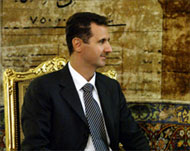Assad speech eyed as showdown looms
An address to the nation on Thursday by Syrian President Bashar al-Assad may be his last chance to avert a showdown with the United Nations over the killing of former Lebanese prime minister Rafiq al-Hariri.

Members of the ruling Baath Party said al-Assad’s speech would call for progress on domestic political reforms and declare his desire to work with a UN probe into al-Hariri’s death, in which the UN has implicated Syrian officials.
“This speech will be a turning point. It will come as a real response direct from the source, clearing up the speculation,” said political analyst and Baath party member Ahmad al-Haj Ali.
But Baath sources said they did not expect al-Assad to respond explicitly to a demand by chief UN investigator Detlev Mehlis that he be allowed to question six Syrian officials in Lebanon over the 14 February assassination.
“He might shed some light generally on this issue but the details will be up to the Syrian judicial committee,” Yasser al-Nehlawi, a member of Syria‘s parliament, told Reuters.
“We are not talking here about Syrian conditions but about points on how to agree on meeting the investigation commission’s request while complying with the agreements between Lebanon and Syria, international law and Syrian national sovereignty.”
Syria is faced with a Security Council resolution demanding that it cooperate with the UN inquiry or face unspecified penalties.
Rules of cooperation
 |
|
Al-Assad’s speech on Thursday |
Last time al-Assad made such a televised speech in March, he announced the withdrawal of Syria‘s troops from neighbouring Lebanon, ending a three-decade military presence amid international outcry and protests in Lebanon over al-Hariri’s murder.
But in a sign that al-Assad’s speech on Thursday could be less than specific, the Syrian committee set up to probe al-Hariri’s murder invited Mehlis to Syria to discuss a “memorandum of understanding” laying down rules of cooperation with the UN probe.
Damascus has dismissed a UN report implicating it in al-Hariri’s killing.
Mehlis has since named al-Assad’s brother-in-law among the six officials he wants to question for a second time, this time in Lebanon rather than Syria.
The UN demand poses a dilemma for al-Assad, who has to choose between moving against members of his inner circle or facing the threat of economic sanctions once the investigation ends in mid-December.